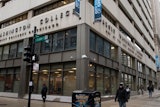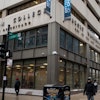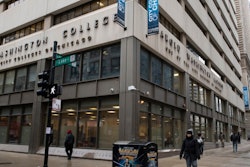One of the surprises emerging from Black Issues’s analysis of the
top one hundred institutions conferring degrees on people of color was
in the rise of proprietary colleges as major players — particularly in
the fields of engineering-related technologies, computer science, and
business.
In fact, the top producer of minority baccalaureates in
engineering-related technologies was a California campus of the ITT
Technical Institutes in California (see page 56 for chart).
The number two and three institutions conferring bachelor’s degrees
in computer and information science on African Americans were also
proprietary schools — Strayer College and DeVry Institute of
Technology (see page 52 for chart).
Why are these schools so popular with students of color? Educators
say proprietary schools have identified an untapped market — recent
high school graduates of color who want a more practical education in a
shorter time than that offered by traditional four-year institutions:
and older, more mature minority employees who view these institutions
as an accessible means of attaining the degrees they need to advance in
their careers.
Observers also say proprietary schools are attractive in today’s
booming job market because they boast good job placement rates and can
tout faculty members who actually work in the fields they teach.
“Proprietary schools like DeVry and ITT are making significant
inroads among minority students who are turned off by traditional
educational institutions who put up barriers to entrance,” says Harold
Lundy, executive director of the Association of Collegiate Business
Schools and Programs. “A whole segment of students has been written off
as uneducable because they don’t have the requisite score on the ACT or
SAT. But these institutions are more open and amenable to inner-city
students.”
Others echo Lundy’s assessment.
“Proprietary schools are a pragmatic choice for a lot of people,”
says John Lee, president of JBL Associates, a higher education
consulting firm in Bethesda, Maryland. Lee says proprietary schools are
attractive to many minority students because they are located in major
cities, often near the neighborhoods where students live or work.
Moreover, since many of the institutions offer classes year round,
students can graduate in less time and get a job faster.
“These students are focused on the fact that they need to have a
stable job making good money,” Lee says. “These are not students
looking for the quintessential college experience — hanging out in the
fraternity or sorority house. They don’t have the luxury of traveling
to Europe for a semester. They need to make money fast, not someday.”
His comments are echoed by Dr. Clifford Adelman, a senior
researcher at the U.S. Department of Education now on loan to The
College Board: “Some of [the proprietary schools] were crooks, rip-off
artists, vultures — particularly on minority populations, particularly
women. But the big chains like DeVry and ITT have gotten good.”
However. some educators are concerned that proprietary school
students are shortchanging their careers. They warn that today’s
booming economy, with employers clamoring to fill many computer
programming or business management jobs, won’t last forever. They add
that students with a more broad-based education from traditional
institutions will fare better in the long run.
“People in the eighties thought engineering was a foolproof
career,” said Dr. Reginald Wilson, a retired American Council on
Education senior scholar. “But waves of people lost their jobs when
defense companies downsized. The vagaries of the economy will make
technical skills obsolete. I believe that a person with a well-rounded
education will be better off in the long-run.”
Indeed, many college administrators contacted for this article
expressed a vigorous skepticism about the quality of education of
proprietary schools, referring to an era before the Department of
Education cracked down on many trade schools that operated as diploma
mills with high default rates. But others say such worries are
unfounded because degree-granting, for-profit institutions are
accredited by the same regional bodies that oversee traditional
four-year institutions. Moreover, they argue, proprietary schools are
more adept at adapting themselves to changes in society, and in today’s
competitive world of higher education other institutions would do well
to model their success.
“If traditional colleges can’t learn to transform themselves to
meet the needs of the market, they’ll be dinosaurs,” says Tony Zeiss,
president of North Carolina’s Central Piedmont Community College.
“Today’s economy is demanding greater productivity, and as a result
workers are discovering they must constantly learn new skills to stay
competitive. But many of these nontraditional students are turning to
proprietary schools and to institutions that offer distance learning or
Internet classes because their schedules don’t mesh with the
traditional academic calendar. Colleges have to ramp up to move faster
and do a better job of providing services,” Zeiss says.
From Storefront to Billion-Dollar Industry
Just a few years ago, the mention of proprietary colleges “conjured
images of storefront schools, promising minority students the moon but
in reality leaving them with worthless certificates and thousands of
dollars in debt,” said Sharon Thomas-Parrott, vice-president of
government relations for DeVry.
Now propriety education has been transformed into a $3.5 billion
industry dominated by national franchises like DeVry that are traded on
the NASDAQ and New York Stock Exchanges.
Headquartered in Oakbrook, Illinois, DeVry has 33,000 students at
its fourteen campuses in the United States and Canada. And the
institution continues to expand as DeVry plans to open two campuses
near San Francisco and New York City this fall.
Thomas-Parrott says although many students hear about DeVry through
word of mouth, and admissions staff visit high schools and often
arrange home visits to talk to parents, the institution also advertises
heavily on radio, on television, and in newspapers.
Forty-five percent of DeVry’s students are minorities, and most of
them are first-generation college students. They are attracted to
DeVry, Thomas-Parrott says, because the campuses are located in their
communities and because of DeVry’s job placement record.
“A lot of our students are working and many also have families,”
Thomas-Parrott says. “They appreciate the fact that we offer a business
and technology curriculum that gets them into the job market much
faster than if they attended a traditional institution.”
Indeed, that’s what attracted Rodney Lott to DeVry. After Lott
graduated from high school in Chattanooga, he attended Tennessee
Technical University, but felt he was wasting money taking classes that
didn’t apply to his engineering major. He left after a year to serve in
the military. When he left the armed services in 1985, he decided to
enroll in DeVry after hearing a friend’s experience. In the beginning,
Lott did have some concerns.
“I didn’t know what kind of degree I would be getting and whether I could get into graduate school,” he says.
But DeVry administrators reassured him that his degree could be
used to attend graduate school, and Lott was impressed with the
school’s placement rate.
“Plus I could get my degree in three years instead of four,” he says.
Tuition rates at proprietary institutions are higher than at
community colleges and public four-year institutions because for-profit
schools get no state subsidies, must pay taxes, and are designed to
earn profits.
For instance, a student would pay about $8,100 for a full-time load
of classes at Strayer University, compared with about $1,492 at
community colleges. However, proprietary institutions do cost less than
many private colleges.
Like other students at accredited institutions, students use
financial aid to offset their costs, especially Pell grants, guaranteed
student loans, and state aid.
Proprietary school officials believe they are also attractive to
minority students because they don’t have entrance requirements that
keep many minority students from attending college.
“A majority of our students are working while returning to school,”
says Maria Boulter, director of public relations for Strayer
University, a for-profit institution with nine campuses, most in the
fast-growing suburbs of Maryland and Virginia. “We offer credits for
life experience and accept transfer credits.”
The university also offers classes in the evening on the Internet,
and lets students and register and order books online. Thirty-nine
percent of Strayer’s 3,900 students are students of color.
“We don’t make them jump through hoops the way traditional institutions do,” Boutler says.
Boutler also notes that students flock to Strayer’s computer
science program because of employers’ desperation for employees with
technical skills: “There are an estimated 19,000 technical jobs going
[unfilled] in this area.”
A Traditional Advantage?
But others sound a note of caution, saying employers’ insatiable demand for technically proficient employees will abate.
“The bubble will burst,” says Bernard J. Milano, partner in charge
of recruiting at KPMG Peat Marwick and director of the Ph.D. project, a
program to diversify the ranks of business school faculty by
encouraging more minorities to get their doctorates in business. “The
technical skills students are learning now will be obsolete in twelve
to eighteen months. I just don’t know if one can rely solely on
technical skills for a long-term successful career.”
Instead Milano says students should be striving to get a
broad-based education that will allow them to negotiate today’s
treacherous job market.
“Undergraduates from traditional institutions will have far more
options, more tools to rely on to manage a long-term successful
career,” he says.
But don’t tell that to Valerie Johnson, a recent graduate of DeVry,
in Kansas City, Missouri. Johnson is headed to Omaha for a job at
Lucent Technology. Before attending DeVry, Johnson was working, but
could not advance in her company because she didn’t have a college
degree.
“DeVry was the answer for me because I didn’t want to take four years to get a degree,” she says.
Johnson says that, unlike the community college she attended after
she graduated from high school, her classes at DeVry and the faculty
emphasized teamwork.
“I worked hard, made a lot of contacts, and now I’m headed for a
job with one of the leading technology companies in the country,” she
says.
COPYRIGHT 1998 Cox, Matthews & Associates
© Copyright 2005 by DiverseEducation.com















